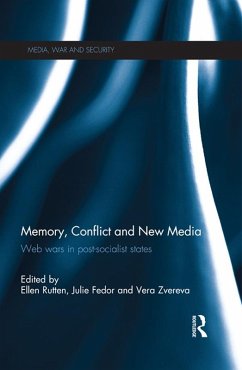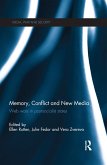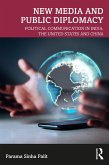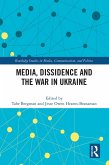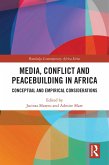Memory, Conflict and New Media (eBook, PDF)
Web Wars in Post-Socialist States
Redaktion: Rutten, Ellen; Zvereva, Vera; Fedor, Julie
53,95 €
53,95 €
inkl. MwSt.
Sofort per Download lieferbar

27 °P sammeln
53,95 €
Als Download kaufen

53,95 €
inkl. MwSt.
Sofort per Download lieferbar

27 °P sammeln
Jetzt verschenken
Alle Infos zum eBook verschenken
53,95 €
inkl. MwSt.
Sofort per Download lieferbar
Alle Infos zum eBook verschenken

27 °P sammeln
Memory, Conflict and New Media (eBook, PDF)
Web Wars in Post-Socialist States
Redaktion: Rutten, Ellen; Zvereva, Vera; Fedor, Julie
- Format: PDF
- Merkliste
- Auf die Merkliste
- Bewerten Bewerten
- Teilen
- Produkt teilen
- Produkterinnerung
- Produkterinnerung

Bitte loggen Sie sich zunächst in Ihr Kundenkonto ein oder registrieren Sie sich bei
bücher.de, um das eBook-Abo tolino select nutzen zu können.
Hier können Sie sich einloggen
Hier können Sie sich einloggen
Sie sind bereits eingeloggt. Klicken Sie auf 2. tolino select Abo, um fortzufahren.

Bitte loggen Sie sich zunächst in Ihr Kundenkonto ein oder registrieren Sie sich bei bücher.de, um das eBook-Abo tolino select nutzen zu können.
This book examines the online memory wars in post-Soviet states - where political conflicts take the shape of heated debates about the recent past, and especially World War II and Soviet socialism.
- Geräte: PC
- mit Kopierschutz
- eBook Hilfe
- Größe: 2.19MB
Andere Kunden interessierten sich auch für
![Memory, Conflict and New Media (eBook, ePUB) Memory, Conflict and New Media (eBook, ePUB)]() Memory, Conflict and New Media (eBook, ePUB)53,95 €
Memory, Conflict and New Media (eBook, ePUB)53,95 €![New Media and Public Diplomacy (eBook, PDF) New Media and Public Diplomacy (eBook, PDF)]() Parama Sinha PalitNew Media and Public Diplomacy (eBook, PDF)43,95 €
Parama Sinha PalitNew Media and Public Diplomacy (eBook, PDF)43,95 €![Media, Dissidence and the War in Ukraine (eBook, PDF) Media, Dissidence and the War in Ukraine (eBook, PDF)]() Media, Dissidence and the War in Ukraine (eBook, PDF)42,95 €
Media, Dissidence and the War in Ukraine (eBook, PDF)42,95 €![Hollywood and the CIA (eBook, PDF) Hollywood and the CIA (eBook, PDF)]() Oliver Boyd BarrettHollywood and the CIA (eBook, PDF)46,95 €
Oliver Boyd BarrettHollywood and the CIA (eBook, PDF)46,95 €![Media, Conflict and Peacebuilding in Africa (eBook, PDF) Media, Conflict and Peacebuilding in Africa (eBook, PDF)]() Media, Conflict and Peacebuilding in Africa (eBook, PDF)43,95 €
Media, Conflict and Peacebuilding in Africa (eBook, PDF)43,95 €![Digital Media and Reporting Conflict (eBook, PDF) Digital Media and Reporting Conflict (eBook, PDF)]() Daniel BennettDigital Media and Reporting Conflict (eBook, PDF)44,95 €
Daniel BennettDigital Media and Reporting Conflict (eBook, PDF)44,95 €![Rethinking Media Coverage (eBook, PDF) Rethinking Media Coverage (eBook, PDF)]() Lisa ParksRethinking Media Coverage (eBook, PDF)38,95 €
Lisa ParksRethinking Media Coverage (eBook, PDF)38,95 €-
-
-
This book examines the online memory wars in post-Soviet states - where political conflicts take the shape of heated debates about the recent past, and especially World War II and Soviet socialism.
Dieser Download kann aus rechtlichen Gründen nur mit Rechnungsadresse in A, B, BG, CY, CZ, D, DK, EW, E, FIN, F, GR, HR, H, IRL, I, LT, L, LR, M, NL, PL, P, R, S, SLO, SK ausgeliefert werden.
Produktdetails
- Produktdetails
- Verlag: Taylor & Francis eBooks
- Seitenzahl: 288
- Erscheinungstermin: 12. April 2013
- Englisch
- ISBN-13: 9781136186424
- Artikelnr.: 38245159
- Verlag: Taylor & Francis eBooks
- Seitenzahl: 288
- Erscheinungstermin: 12. April 2013
- Englisch
- ISBN-13: 9781136186424
- Artikelnr.: 38245159
- Herstellerkennzeichnung Die Herstellerinformationen sind derzeit nicht verfügbar.
Ellen Rutten is Professor of Slavic Literatures and Cultures at the University of Amsterdam, and is author of Unattainable Bride Russia (2010). Julie Fedor is a Research Associate at the University of Cambridge, UK. She is author of Russia and the Cult of State Security (Routledge, 2011) and a contributing author to Remembering Katyn (Polity Press, 2012). Vera Zvereva is a Research Fellow at the Princess Dashkova Russian Centre, Edinburgh University, UK, and is author of Network Talks: Cultural Communication on the Russian Internet (University of Bergen, 2012) and Real Life on TV Screen (RSUH, 2012).
Introduction: Old Conflict, New Media: Post-Socialist Digital Memories,
Ellen Rutten and Vera Zvereva Part I: Concepts of Memory 1. Europe's Other
World: Romany Memory within the New Dynamics of the Globital Memory Field,
Anna Reading 2. Mourning and Melancholia in Putin's Russia: An Essay in
Mnemonics, Alexander Etkind 3. Memory Events and Memory Wars: Victory Day
in L'viv, 2011 through the Prism of Quantitative Analysis, Galina
Nikiporets-Takigawa 4. War of Memories in the Ukrainian Media: Diversity of
Identities, Political Confrontation, and Production Technologies,
Volodymyr Kulyk 5. #Holodomor - Twitter and Public Discourse in Ukraine,
Martin Paulsen Part II: Words of Memory 6. 'A Stroll Through the Keywords
of my Memory': Digitally Mediated Commemoration of the Soviet Linguistic
Heritage, Ingunn Lunde 7. Memory and Self-Legitimization in the Russian
Blogosphere: Argumentative Practices in Historical and Political
Discussions in Russian-Language Blogs of the 2000s, Ilya Kukulin 8.
Building Wiki-History: Between Consensus and Edit Warring, Helene
Dounaevsky 9. News Framing under Conditions of Unsettled Conflict: An
Analysis of Georgian Online and Print News around the 2008 Russo-Georgian
War, Doreen Spoerer-Wagner 10. Rust on the Monument: Challenging the Myth
of Victory in Belarus, Aliaksei Lastouski Part III: Images of Memory 11.
Between RuNet and UkrNet: Mapping the Crimean Web War, Maria Pasholok 12.
Repeating History? The Computer Game as Historiographic Device, Gernot
Howanitz 13. The Digital (Artistic) Memory of Nicolae Ceausescu, Caterina
Preda 14. Witnessing War, Globalizing Victory: Representations of World War
II on the Website Russia Today, Jussi Lassila 15. From 'The Second Katyn'
to 'A Day Without Smolensk': Facebook Responses to the Smolensk Tragedy and
its Aftermath, Dieter de Bruyn Conclusion, Julie Fedor Timeline: New Media
and Memory Politics
Ellen Rutten and Vera Zvereva Part I: Concepts of Memory 1. Europe's Other
World: Romany Memory within the New Dynamics of the Globital Memory Field,
Anna Reading 2. Mourning and Melancholia in Putin's Russia: An Essay in
Mnemonics, Alexander Etkind 3. Memory Events and Memory Wars: Victory Day
in L'viv, 2011 through the Prism of Quantitative Analysis, Galina
Nikiporets-Takigawa 4. War of Memories in the Ukrainian Media: Diversity of
Identities, Political Confrontation, and Production Technologies,
Volodymyr Kulyk 5. #Holodomor - Twitter and Public Discourse in Ukraine,
Martin Paulsen Part II: Words of Memory 6. 'A Stroll Through the Keywords
of my Memory': Digitally Mediated Commemoration of the Soviet Linguistic
Heritage, Ingunn Lunde 7. Memory and Self-Legitimization in the Russian
Blogosphere: Argumentative Practices in Historical and Political
Discussions in Russian-Language Blogs of the 2000s, Ilya Kukulin 8.
Building Wiki-History: Between Consensus and Edit Warring, Helene
Dounaevsky 9. News Framing under Conditions of Unsettled Conflict: An
Analysis of Georgian Online and Print News around the 2008 Russo-Georgian
War, Doreen Spoerer-Wagner 10. Rust on the Monument: Challenging the Myth
of Victory in Belarus, Aliaksei Lastouski Part III: Images of Memory 11.
Between RuNet and UkrNet: Mapping the Crimean Web War, Maria Pasholok 12.
Repeating History? The Computer Game as Historiographic Device, Gernot
Howanitz 13. The Digital (Artistic) Memory of Nicolae Ceausescu, Caterina
Preda 14. Witnessing War, Globalizing Victory: Representations of World War
II on the Website Russia Today, Jussi Lassila 15. From 'The Second Katyn'
to 'A Day Without Smolensk': Facebook Responses to the Smolensk Tragedy and
its Aftermath, Dieter de Bruyn Conclusion, Julie Fedor Timeline: New Media
and Memory Politics
Introduction: Old Conflict, New Media: Post-Socialist Digital Memories,
Ellen Rutten and Vera Zvereva Part I: Concepts of Memory 1. Europe's Other
World: Romany Memory within the New Dynamics of the Globital Memory Field,
Anna Reading 2. Mourning and Melancholia in Putin's Russia: An Essay in
Mnemonics, Alexander Etkind 3. Memory Events and Memory Wars: Victory Day
in L'viv, 2011 through the Prism of Quantitative Analysis, Galina
Nikiporets-Takigawa 4. War of Memories in the Ukrainian Media: Diversity of
Identities, Political Confrontation, and Production Technologies,
Volodymyr Kulyk 5. #Holodomor - Twitter and Public Discourse in Ukraine,
Martin Paulsen Part II: Words of Memory 6. 'A Stroll Through the Keywords
of my Memory': Digitally Mediated Commemoration of the Soviet Linguistic
Heritage, Ingunn Lunde 7. Memory and Self-Legitimization in the Russian
Blogosphere: Argumentative Practices in Historical and Political
Discussions in Russian-Language Blogs of the 2000s, Ilya Kukulin 8.
Building Wiki-History: Between Consensus and Edit Warring, Helene
Dounaevsky 9. News Framing under Conditions of Unsettled Conflict: An
Analysis of Georgian Online and Print News around the 2008 Russo-Georgian
War, Doreen Spoerer-Wagner 10. Rust on the Monument: Challenging the Myth
of Victory in Belarus, Aliaksei Lastouski Part III: Images of Memory 11.
Between RuNet and UkrNet: Mapping the Crimean Web War, Maria Pasholok 12.
Repeating History? The Computer Game as Historiographic Device, Gernot
Howanitz 13. The Digital (Artistic) Memory of Nicolae Ceausescu, Caterina
Preda 14. Witnessing War, Globalizing Victory: Representations of World War
II on the Website Russia Today, Jussi Lassila 15. From 'The Second Katyn'
to 'A Day Without Smolensk': Facebook Responses to the Smolensk Tragedy and
its Aftermath, Dieter de Bruyn Conclusion, Julie Fedor Timeline: New Media
and Memory Politics
Ellen Rutten and Vera Zvereva Part I: Concepts of Memory 1. Europe's Other
World: Romany Memory within the New Dynamics of the Globital Memory Field,
Anna Reading 2. Mourning and Melancholia in Putin's Russia: An Essay in
Mnemonics, Alexander Etkind 3. Memory Events and Memory Wars: Victory Day
in L'viv, 2011 through the Prism of Quantitative Analysis, Galina
Nikiporets-Takigawa 4. War of Memories in the Ukrainian Media: Diversity of
Identities, Political Confrontation, and Production Technologies,
Volodymyr Kulyk 5. #Holodomor - Twitter and Public Discourse in Ukraine,
Martin Paulsen Part II: Words of Memory 6. 'A Stroll Through the Keywords
of my Memory': Digitally Mediated Commemoration of the Soviet Linguistic
Heritage, Ingunn Lunde 7. Memory and Self-Legitimization in the Russian
Blogosphere: Argumentative Practices in Historical and Political
Discussions in Russian-Language Blogs of the 2000s, Ilya Kukulin 8.
Building Wiki-History: Between Consensus and Edit Warring, Helene
Dounaevsky 9. News Framing under Conditions of Unsettled Conflict: An
Analysis of Georgian Online and Print News around the 2008 Russo-Georgian
War, Doreen Spoerer-Wagner 10. Rust on the Monument: Challenging the Myth
of Victory in Belarus, Aliaksei Lastouski Part III: Images of Memory 11.
Between RuNet and UkrNet: Mapping the Crimean Web War, Maria Pasholok 12.
Repeating History? The Computer Game as Historiographic Device, Gernot
Howanitz 13. The Digital (Artistic) Memory of Nicolae Ceausescu, Caterina
Preda 14. Witnessing War, Globalizing Victory: Representations of World War
II on the Website Russia Today, Jussi Lassila 15. From 'The Second Katyn'
to 'A Day Without Smolensk': Facebook Responses to the Smolensk Tragedy and
its Aftermath, Dieter de Bruyn Conclusion, Julie Fedor Timeline: New Media
and Memory Politics
